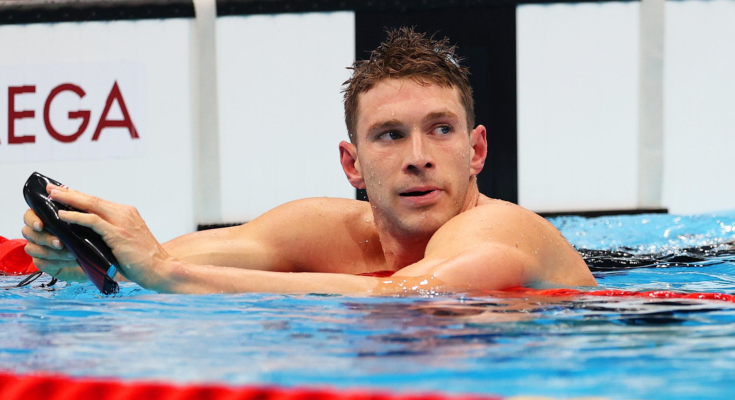TOKYO — The reporter chased Ryan Murphy down a sidewalk outside the Aquatics Center and rather than ask a question, he issued an accusation.
“You’ve completely ruined Evgeny’s moment,” he said. He was referencing Evgeny Rylov, the Russian swimmer who’d just won his second gold medal of the Olympics.
Hours later, nobody was talking about that medal, because Murphy, after losing to Rylov for the second time in four days, had questioned whether the 200-meter backstroke final was clean. “I do believe there is doping in swimming,” Murphy said. He never specifically accused Rylov of cheating, but he steered the conversation here, on the seventh full day of the Games, toward a relitigation of Russia’s infamous state-sponsored doping scheme, and away from the fuzzy topics the Olympics think they’re supposed to be about.
And some thought that was classless, the accusations baseless, the motives bitter.
Murphy thought it was necessary, and he’s right.
It is necessary because Russian athletes cheated, and because we’ll never know which ones did, and because authorities don’t seem to care.
Some anti-doping officials have called for a blanket ban on Russian athletes as punishment for the state-run program. Their argument is that picking and choosing between clean athletes and dirty ones has been made impossible by Russia’s tampering with evidence. A World Anti-Doping Agency (WADA) investigation found scores of cases of suspected performance-enhancing drug use, but in at least 145 of them, athletes couldn’t be convicted because Russia had either deleted or altered records.
“The obvious intent by manipulating the data was to ensure doped athletes were able to escape sanction,” Travis Tygart, the CEO of the U.S. Anti-Doping Agency, said last year. “Now we can never know, and all are necessarily part of the cover-up, as sad as it may seem, if there are truly innocent ones.”
WADA’s natural conclusion was that, at the very least, any Russian athlete hoping to compete at the Olympics should have to prove their innocence. But in December, the Court of Arbitration for Sport delivered a decision that anti-doping officials called “watered-down and devastating.” It shifted the burden of proof from athletes back to anti-doping officials, who’d have to prove athlete guilt to bar them from the Games — but who had little to no proof that individual athletes cheated because, again, Russia disposed of evidence.
So now, hundreds of Russian athletes are allowed to compete at these Olympics. They wear white, blue and red. Their flag has white, blue and red on it. Their name includes the word “Russian.” Their fans chant “Rus-SEE-a!” They are Russian. And although they may be clean, none were forced to prove it.
And so here we are, with no evidence that Rylov or anybody else cheated, but with understandable suspicion. This is what Murphy meant when he said, again and again, that he couldn’t answer questions with certainty, or make specific allegations, “because of things that have happened over the past.” There was a state-sponsored doping scheme and cover-up. Many athletes benefitted and were protected. Relatively few have been punished. Some, in all likelihood, are here in Tokyo.
It is not right, and yet if Murphy had kept silent, wrongdoing would be swept under a giant, International Olympic Committee-embroidered rug. The IOC, which made its bed with Russia long ago, had opposed harsh penalties. It has significant influence over WADA. Perhaps more importantly, its vice president, John Coates, is also the president of the International Council of Arbitration for Sport, which oversees the Court of Arbitration for Sport, which made the crucial December decision.
It is a web of conflicts of interest and powerful people who desperately want to see the Olympics roll on unperturbed, and it’s responsible for the laughable, lenient decision to allow Russia to compete here. It emboldens Russia, just a few years after the sweeping doping program was uncovered, to flaunt its attendance.
It’s why the Russian Olympic committee had the gall, hours after Murphy’s comments, to tweet a photo of him and say: “How unnerving our victories are for some of our colleagues. Yes, we are here at the Olympics. Whether someone likes it or not. The old barrel organ started the song about Russian doping again. English-language propaganda, oozing with verbal sweat in the Tokyo heat. Through the mouths of athletes offended by defeats. We will not console you. Forgive us, those who are weaker. God is their judge. And for us — an assistant.”
And it is why Murphy and others have to speak up.
It should not be on Ryan Murphy to police doping in sports. He should not feel the need to create an international firestorm instead of cherishing an Olympic medal. It should not be on any athlete, amateur or pro.
But Olympic authorities have left them with no choice.
More from Yahoo Sports:


